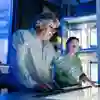Teaching Excellence Academy
Our Teaching Excellence Academy celebrates, develops and promotes excellent teaching across our University. We're proud to say that over two-thirds of our teaching staff have gained credentials through Fellowship of the Higher Education Academy. That’s 20% above the average for the sector.

Celebrate
We celebrate excellent teaching through local, national and international reward and recognition and are absolutely committed to the student experience. We’ll celebrate those who give students every opportunity to reach their potential.
Develop
We develop excellent teaching through a framework of academic and professional development activities and carefully curated resources. Our suite of activities are grounded in scholarship and everything is tailored to developing our students, our staff and our University.
Promote
We promote excellent teaching by sharing the great practice we see here at the University of Hull. We work to inspire and excite staff by sharing pedagogic practices that will stretch students academically and give them the skills to achieve by being critical, creative and enterprising.
Latest news
Discover the latest news in education, student experience, staff development and teaching across our University.
Our people
Our Teaching Excellence Academy team works at all levels from strategic to operational to support teaching colleagues in delivering an excellent experience of our students.
This could be through developing programmes of study, advising on the best use of technology for teaching and helping to improve learning resources for students with a variety of needs.
Support is offered on a one-to-one basis or through a variety of online and face-to-face workshops.
| Team member | Position | Get in touch |
|---|---|---|
| Mike Ewen | Head of Teaching Excellence Academy | Michael.Ewen@hull.ac.uk |
| Dr Catherine Lillie | Teaching Enhancement Advisor | C.Lillie@hull.ac.uk |
| Dr Michelle Smith | Teaching Enhancement Advisor | Michelle.A.Smith@hull.ac.uk |
| Kate Bridgeman | Educational Developer | Kate.Bridgeman@hull.ac.uk |
| Adam Craik | Educational Developer | A.Craik@hull.ac.uk |
| Tom Tomlinson | Educational Developer | T.Tomlinson@hull.ac.uk |
| Ailie McNicol | Educational Developer | A.R.McNicol@hull.ac.uk |
| Emily Armstrong | Digital Specialist | E.J.Armstrong@hull.ac.uk |
| Dr Adewale Adesina | Digital Specialist | A.Adesina@hull.ac.uk |
| Carole Craven | Senior Administrator | C.Craven@hull.ac.uk |
| Dominique Esnault | Administrator (Scholarship of Learning and Teaching) | D.Esnault@hull.ac.uk |